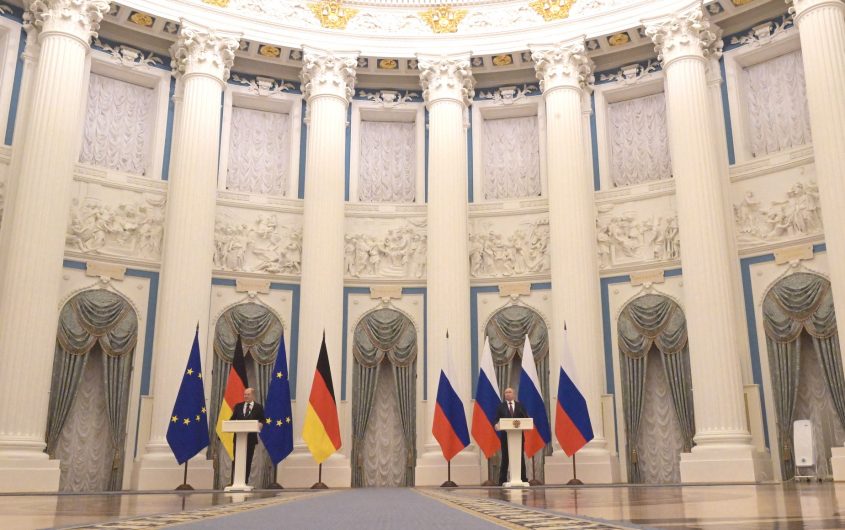
kremlin.ru via Wikimedia Commons
Led From Behind

Jonas J. Driedger
Paul H. Nitze School of Advanced International Studies (SAIS), Johns Hopkins University
Dr. Jonas J. Driedger is a DAAD Postdoctoral Fellow at the Kissinger Center for Global Affairs at the Paul H. Nitze School of Advanced International Studies (SAIS), Johns Hopkins University. At SAIS, Dr. Driedger researches transatlantic options for stability in the neighborhoods of Russia and China. He specializes in the causes of peace and conflict between major military powers and their less powerful neighbors, conflict-averting policy options of third states, the politics of regime survival, deterrence, “hybrid” conflict measures and security cooperation in international relations, with a regional focus on Russia and its relations to its neighboring states, Europe, and the United States.
Mr. Driedger was a Doctoral Researcher at the European University Institute in Florence, Italy. In his dissertation, he assesses the causes of peace and armed conflict between major powers and nearby states with inferior military capabilities. A College of Europe graduate, he was an Alfa Fellow and Visiting Researcher at the Moscow Higher School of Economics. He taught and did fieldwork in Germany, Italy, Ukraine, and Russia. Apart from his academic publications, Jonas contributed analyses and policy advice in German, Russian, and English, including to the George C. Marshall European Center for Security Studies, the Oxford University Changing Character of War Centre, Politico Europe, The National Interest, EUObserver, and EurActiv. His recent article, "Will Russia intervene in Belarus?" was published by the EUIdeas blog.
During his fellowship, Jonas investigated how the Trump presidency had affected U.S.-German security cooperation toward Russia. Were the bitter exchanges between Donald Trump and Angela Merkel indicative of a rapidly widening divergence on Russia? Trump expressed sympathy for Russian president Vladimir Putin, while Merkel, upon Trump’s electoral victory, called for European “strategic autonomy” and made future transatlantic cooperation contingent on adherence to fundamental values. Alternatively, one might well have asked whether these bitter public exchanges covered up that, at the policy level and between key mid-tier policymakers, there was little to no change in how the two countries cooperated toward Russia. These questions were particularly urgent, as Russian conduct was unlikely to become less aggressive. Recent constitutional reforms cemented Putin’s domineering position over Russia and the Kremlin continued assertive policies in Syria, Ukraine, and Western domestic affairs. With the United Kingdom having left the European Union, and France largely focused inward and toward Africa, the United States and Germany emerged as the key linchpin of effective Western policy toward Russia. Managing this relationship well required a thorough understanding of how the Trump presidency had affected it, and what the likely effects of the 2020 elections would be.
The DAAD/AICGS Research Fellowship is supported by the DAAD with funds from the Federal Foreign Office.
Understanding Germany’s Changing Russia Policy
Since late 2021, with an ever more apparent threat of Russia invading Ukraine, NATO states increasingly sent military aid to Ukraine and signaled to Moscow that an attack would be severely punished. Germany’s newly-elected government, however, long stuck to a policy of diplomatic engagement and was muted and vague in its support for sanctions. Only when the actual invasion was underway did Germany change its course—but then rapidly so. From February 22 to 27, 2022, Germany halted the Nord Stream 2 pipeline, started weapons deliveries to Ukraine, and announced massive increases in defense spending. Chancellor Olaf Scholz termed this a Zeitenwende, translatable to “paradigm shift.” AGI’ss Jeff Rathke has called it a “revolution.” As Ukraine, NATO allies, and parts of German society continue to criticize the Scholz administration for its Russia policy, it pays to take a deeper look and ask why German policy took so long to change before the invasion, why it then changed so quickly, and why it took the forms it took.
The new government, which assumed office on December 8, 2021, initially followed the policies of the previous administration, eschewing military means and emphasizing diplomatic engagement over sanctions. This approach echoed majority views, as a poll conducted right after the federal elections found more Germans supported German restraint rather than more involvement in international crises. On November 15, 2021, amid mounting signs that Russia might prepare for an invasion of Ukraine, the foreign ministers of Germany and France jointly warned Russia that any attempt to violate the territorial integrity of Ukraine would have “serious consequences.” However, these consequences were not specified, and Nord Stream 2 was not named. Berlin maintained this vague rhetoric until right before the invasion.
On German defense spending and military capabilities, the new coalition long remained non-committal. The coalition treaty did not even mention the NATO target for military spending (two percent of gross domestic product), let alone committing to it. Germany also long abstained from supplying weapons to Ukraine. The coalition treaty emphasized the new government would pursue an even more restrictive course on arms exports than previous administrations. This policy arguably reflects widely held German beliefs that arms exports invariably lead to conflict escalation. Indeed, in late January 2022, German Defense Minister Christine Lambrecht stated that sending weapons to Ukraine “will not help to defuse the crisis at the moment.”
However, Ukraine and NATO allies increasingly pressured Berlin to do more, especially after Germany blocked Estonian shipments of formerly German weapons to Ukraine in January. Similarly, when Lambrecht announced on January 26 that Germany would send 5,000 combat helmets to Ukraine, anxiously naming them “equipment, not weapons,” Ukrainian Ambassador to Germany Andriy Melnyk called this measure a “mere symbolic gesture,” demanding a “true paradigm shift” from Germany.
Overall, Germany’s Russia policy between late 2021 and early 2022 was marked by inertia and reactiveness, rather than proactive and forward-looking deliberation.
Germany only shifted policy when Russia, in preparation of the invasion, recognized the separatist entities on Ukraine’s legal territory on February 21. This blatantly violated the Minsk agreements, which Germany had hoped would allow for a peaceful crisis resolution. With Berlin in shock, Scholz finally turned German policy around. Keeping a promise he had given in secret talks with U.S. policymakers in early February, he agreed to sanctions and halted Nord Stream 2.
When Russia invaded unoccupied Ukrainian territory on February 24, Germany again agreed on further EU sanctions but successfully opposed shutting Russia out of the Society for Worldwide Interbank Financial Telecommunication (SWIFT). Nonetheless, Berlin was under immense pressure to do more. In a rapid shift, a majority of Germans now disapproved of how the government handled the crisis. When Italy and Austria gave up resistance to SWIFT sanctions, Scholz finally agreed to cut specific Russian banks out on February 26.
On the same day, ever on the backfoot, Berlin was faced with a Dutch request to send German-manufactured weapons to Ukraine. Remembering the fallout from the Estonia incident, Berlin allowed it. Vice Chancellor Robert Habeck from the Greens, who had advocated for the policy since Spring 2021, seized the opportunity, arguing that if Germany permitted others to send its weapons to Ukraine, it should do so itself. This, too, became German policy on February 26.
When officially announcing these major policy shifts, Scholz added yet another one. In an emergency meeting of the German parliament on February 27, the chancellor declared the creation of a special defense fund of 100 billion Euros and an increase in annual defense spending to over two percent of gross domestic product. Most of his cabinet had only learned about this in the morning of the same day.
Berlin tends to maintain the courses it has set, seeking to pursue its policies multilaterally and embed them into its favorite international institutions – the EU and NATO.
Overall, Germany’s Russia policy between late 2021 and early 2022 was marked by inertia and reactiveness, rather than proactive and forward-looking deliberation. The newly-elected German elite long stuck to a policy of diplomatic engagement and limited sanctions. This was arguably in part because the administration had just come in and had to balance the interests of its three constituent parties. Furthermore, the existing policy was in line with societal views and had been formed under still-influential figures such as ex-Chancellor Merkel (CDU) and President Steinmeier (SPD) who had been foreign minister from 2005 to 2009 and from 2013 to 2017.
However, at the dawn of the invasion, the failure of previous policies had become undeniable, pressure from Ukraine and NATO allies peaked, and public opinion finally shifted. Reacting to this untenable situation, key figures in the German elite pushed through a series of measures that NATO allies and Ukraine had long demanded.
This reactive nature of German foreign policy seems to be part of a pattern. The Fukushima nuclear disaster in Japan in 2011 caused the Merkel II administration to drastically revert course on German nuclear energy. In 2014, when Russia annexed Crimea and fomented hybrid war in Donbas, Germany was instrumental in organizing joint EU and transatlantic sanctions and increasing NATO deterrence in the Baltics.
Judging by its longevity, this reactive way of German policymaking is unlikely to change anytime soon. Hence, Berlin will probably not become a European leader in military matters, be it toward Ukraine, Russia, or elsewhere. But it has gone a long way in this very area in a short period of time. As Germany’s steadfastness toward Russia during the Trump administration demonstrates, Berlin tends to maintain the courses it has set, seeking to pursue its policies multilaterally and embed them into its favorite international institutions – the EU and NATO. The German way of foreign policy might be a blessing in disguise for future transatlantic security cooperation.








